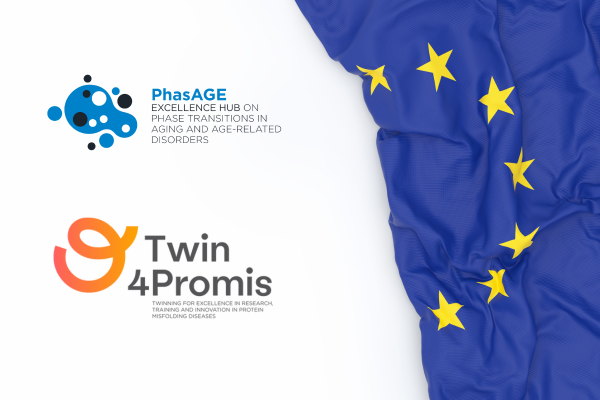Science without borders
A closer look at VIB’s EU Twinning projects: Twin4Promis and PhasAGE
For over two decades, EU Twinning projects have fostered scientific collaboration between EU Member States. These partnerships between universities enable the exchange of knowledge, expertise, and best practices. The life sciences, after all, thrive on international collaboration.
Today, we delve into two such EU Twinning projects at VIB: Twin4Promis and PhasAGE, both of which aim to deepen our understanding of crucial disease processes. While Twin4Promis embarks on its journey, PhasAGE concludes its three-year odyssey. Here are their stories.
Sharing the code of protein misfolding
In November 2022, Twin4Promis left its launchpad, ready to tackle the challenge of protein misfolding. In the world of biology, the proper functioning of a protein hinges on its ability to fold correctly. Misfolding lies at the root of a range of human diseases, from Alzheimer’s to cystic fibrosis. This project, aptly named “Twinning for Excellence in Research, Training, and Innovation in Protein Misfolding Diseases,” brings together institutions with a common goal—understanding how protein misfolding contributes to many diseases.
Twin4Promis unites scientists from across Europe in a collective effort to tackle these challenges. The project’s partners include the Institute of Chemical Biology at the National Hellenic Research Foundation (NHRF) in Greece, the University of Cambridge, and the University of Copenhagen. On VIB’s side, members of the Switch lab at the VIB-KU Leuven Center for Brain & Disease Research contribute their expertise to this mission.
“We decided to join Twin4Promis to contribute our knowledge and expertise,” says Joost Schymkowitz, who heads the Switch lab together with Frederic Rousseau. “Our contributions on protein misfolding shouldn’t just stop at our desk; we wanted our work to be the building blocks of shared knowledge and collective progress.”
Twin4Promis at the Athens kick-off event:
Shared insights on age-related disorders
Meanwhile, the PhasAGE project, or the “Excellence Hub on Phase Transitions in Aging and Age-Related Disorders,” is concluding its three-year collaboration. Its mission? To demystify biomolecular phase transitions in the context of aging. Within a cell, biomolecular phase separation is the formation of dynamic clusters of proteins and nucleic acids. Alterations in these clusters can disrupt normal cellular functions, contributing to the complexity of aging and age-related diseases.
The project was a collaborative venture between VIB, the Autonomous University of Barcelona, the University of Padova, and the Instituto de Biologia Molecular e Celular (IBMC) in Porto.
Peter Tompa from the VIB-VUB Center for Structural Biology is an expert on phase transition, and Ludo Van Den Bosch from VIB-KU Leuven Center for Brain & Disease Research specializes in understanding their impact on age-related disorders.
Peter Tompa reflects on the PhasAGE project, “Our participation in the PhasAGE project has been a great journey. It’s given us the chance to work with brilliant minds, and now, as we conclude this collaboration, I can proudly say we’ve contributed to a deeper understanding of age-related disorders, which has paved the way to develop drugs against these, so far, incurable maladies.”
Prof. Tompa and Prof. Van Den Bosch presenting their work at the latest PhasAGE conference:
From goals to achievements
One of the central goals of these projects is to facilitate the exchange of students and researchers between partner institutions, fostering cross-cultural collaboration, broadening horizons, and exposing participants to diverse research environments. Frederic Rousseau from Twin4Promis notes, “Our Greek partners plan to visit our lab soon. The exchange of students and experts not only benefits the participating individuals but also contributes to the development of research ecosystems in the partners’ countries.”
Scientific gatherings, such as conferences and workshops, are also vital components of these projects. They provide platforms for sharing research findings, sparking new ideas, and forging connections within and beyond the consortium. Peter Tompa, organizer of an international conference for PhasAGE, emphasizes the importance of such meetings, “These gatherings have propelled our international collaboration and networking, encouraging interactions with the world beyond our consortium.”
EU Twinning projects like Twin4Promis and PhasAGE exemplify the transformative power of international collaborations. They offer numerous advantages for all the partner organizations by transcending borders to unite scientists and paving the way to a more interconnected and innovative future in scientific research.
Want to be kept up-to-date on our biotechnological news and stories? Join our community and subscribe to our bi-monthly newsletter.
India Jane Wise
Related stories

.png)



.png)




